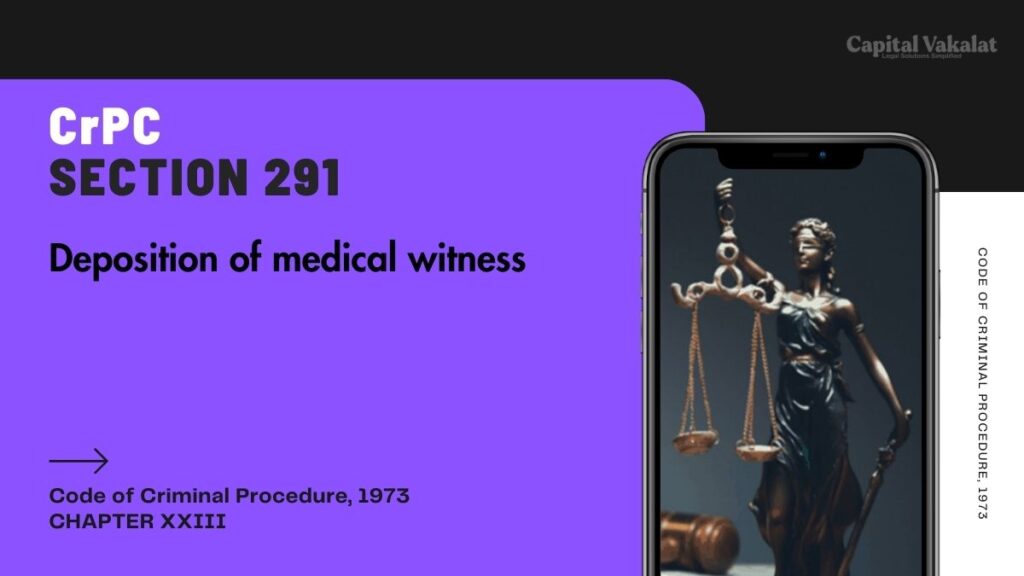The Indian legal system is a complex web of statutes and procedural rules designed to ensure justice. Among these, the Criminal Procedure Code (CrPC) plays a pivotal role in guiding criminal proceedings. One significant provision under this code is Section 291 CrPC: Deposition of Medical Witness.

This section facilitates the introduction of medical evidence into court records, streamlining the legal process. This article delves into the nuances of Section 291 CrPC, its implications, and the broader context within which it operates.
Bare Act. Section 291 Cr.P.C.
Deposition of medical witness.
(1) The deposition of civil surgeon or other medical witness, taken and attested by a Magistrate in the presence of the accused, or taken on commission under this Chapter, may be given in evidence in any inquiry, trial or other proceeding under this Code, although the deponent is not called as a witness.
(2) The Court may, if it thinks fit, and shall, on the application of the prosecution or the accused, summon and examine any such deponent as to the subject-matter of his deposition.
STATE AMENDMENT
Gujarat
In the principal Act, in section 291, in sub-section (1), after the words “in the presence of accused”, the words “or, as the case may be through the medium of Electronic Video Linkage” shall be inserted.
[Vide Gujarat Act 31 of 2017, sec. 5.]
Section 291 CrPC: Deposition of Medical Witness
Understanding the Legal Provision
Section 291 of the Criminal Procedure Code pertains to the deposition of medical witnesses. It allows for the written deposition of medical practitioners to be used as evidence in court, thereby eliminating the need for the medical witness to be physically present. This provision is particularly significant in cases where medical evidence is crucial, such as in cases of bodily harm, sexual assault, or any other scenario requiring medical testimony.
Text of Section 291 CrPC
The actual text of Section 291 CrPC reads:
“When any document is produced before any court purporting to be a report under the hand of a Government medical officer upon any matter or thing duly submitted to him for examination or analysis and report in the course of any proceeding under this Code, the Court may, if it thinks fit, summon and examine such officer as to the subject matter thereof.”
This provision enables the court to consider written reports by medical officers as evidence, subject to the court’s discretion to summon the medical officer if deemed necessary.
Significance of Section 291 CrPC
Streamlining Legal Processes
The primary advantage of Section 291 CrPC is the streamlining of legal proceedings. Medical professionals often have demanding schedules, and their physical presence in court can lead to significant delays. By allowing written depositions, the court can expedite cases without compromising on the quality of evidence.
Ensuring Accurate Medical Evidence
Medical reports provide precise and scientific evidence that can be critical in criminal cases. Section 291 CrPC ensures that such evidence is considered with the same seriousness as any other testimonial evidence, thereby upholding the integrity of the judicial process.
Challenges and Considerations
Verification of Medical Reports
While Section 291 CrPC facilitates the use of medical reports, it also opens up potential challenges, such as the verification of the authenticity of these documents. Courts must be vigilant in ensuring that the reports are genuine and accurately reflect the medical examination.
Summoning Medical Witnesses
Although written depositions are permitted, courts retain the discretion to summon medical witnesses if necessary. This ensures that the medical witness can be cross-examined, maintaining the adversarial nature of criminal trials and protecting the rights of the accused.
Broader Implications
Impact on Victim Testimonies
In cases involving bodily harm or sexual assault, medical evidence can substantiate the victim’s testimony, providing crucial support for their claims. Section 291 CrPC thus plays a vital role in ensuring that justice is served in such sensitive cases.
Legal Precedents and Interpretations
Over the years, various legal precedents have shaped the interpretation of Section 291 CrPC. Courts have consistently upheld the validity of medical depositions, recognizing their importance in delivering timely and accurate justice.
Role of Technology
With advancements in technology, the manner in which medical evidence is presented has evolved. Digital records and electronic submissions are becoming more common, further enhancing the efficiency of legal processes.
Conclusion
Section 291 CrPC: Deposition of medical witness is a critical provision in the Indian Criminal Procedure Code, ensuring that medical evidence is efficiently and accurately presented in court. By allowing written depositions, it streamlines legal processes while upholding the integrity of the evidence. However, it also mandates vigilance in verifying the authenticity of medical reports and allows for the summoning of medical witnesses when necessary. As technology continues to advance, the application of Section 291 CrPC will evolve, further enhancing the administration of justice.